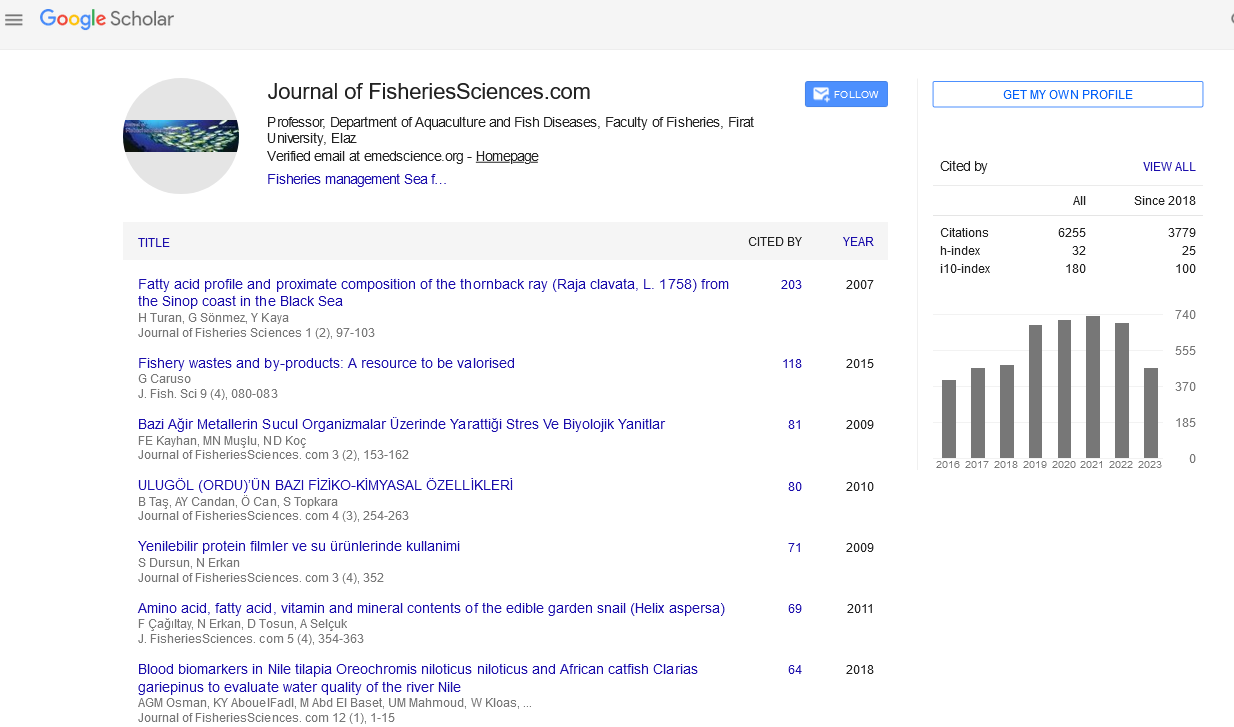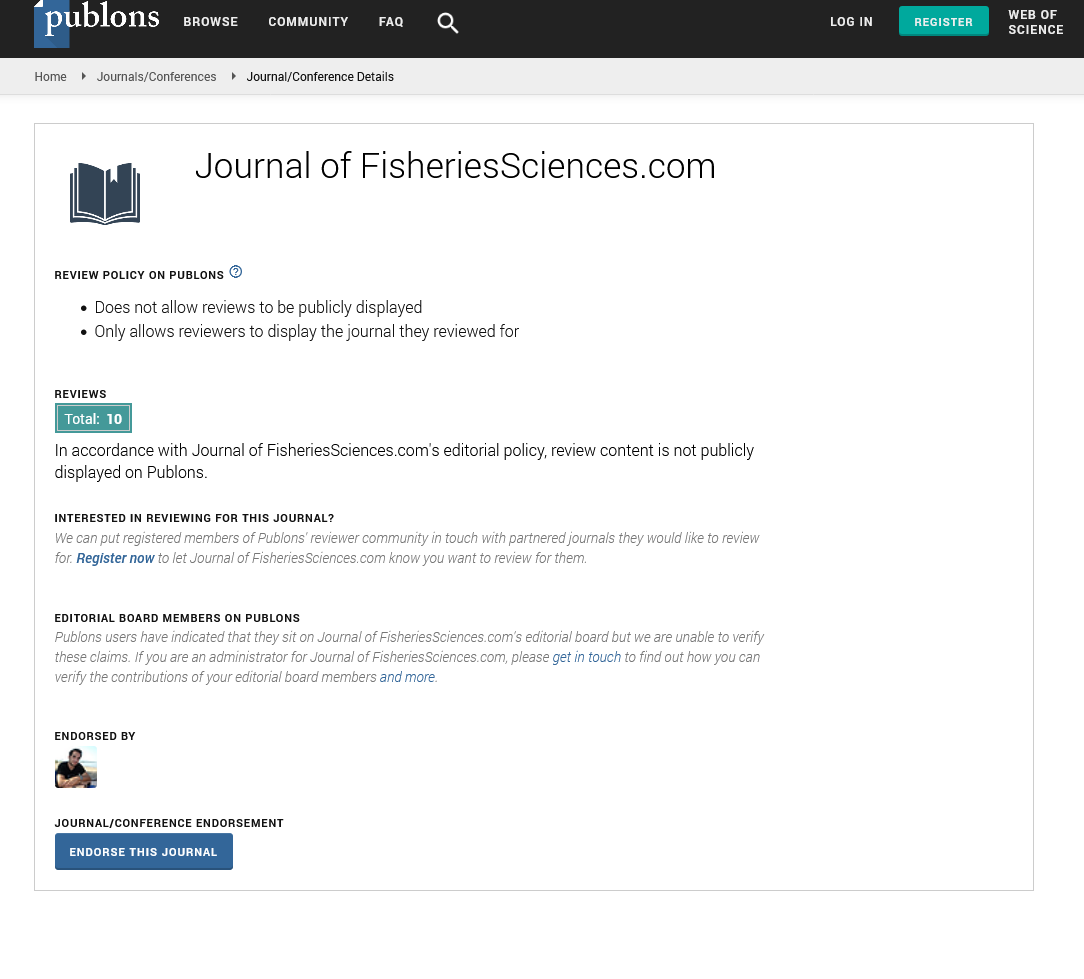Perspective - (2024) Volume 18, Issue 5
The Impact of Climate Change on Marine Ecosystems: A Comprehensive Overview
Ruixin Peng*
Department of Aquaculture, St. Francis University, Recife, Brazil
*Correspondence:
Ruixin Peng, Department of Aquaculture, St. Francis University, Recife,
Brazil,
Email:
Received: 29-Jul-2024, Manuscript No. IPFS-24-15079;
Editor assigned: 02-Aug-2024, Pre QC No. IPFS-24-15079 (PQ);
Reviewed: 16-Aug-2024, QC No. IPFS-24-15079;
Revised: 01-Oct-2024, Manuscript No. IPFS-24-15079 (R);
Published:
29-Oct-2024
Introduction
Climate change represents one of the most significant global
challenges of our time, with profound implications for marine
ecosystems. As greenhouse gas emissions rise, altering
atmospheric and oceanic conditions, marine environments are
undergoing substantial transformations. This article explores the
multifaceted impact of climate change on marine ecosystems,
examining changes in temperature, ocean acidification, sea level
rise and the broader ecological consequences. It also considers
the potential socio-economic impacts and discusses strategies
for adaptation and mitigation.
Description
Rising sea temperatures and their effects
One of the most direct impacts of climate change on marine
ecosystems is the increase in sea temperatures. Global average
sea surface temperatures have risen over the past century, with
significant effects on marine life:
Coral bleaching: Coral reefs, often referred to as the
"rainforests of the sea," are particularly vulnerable to
temperature increases. Elevated sea temperatures cause coral
bleaching, a phenomenon where corals expel their symbiotic
zooxanthellae, leading to loss of color and vital nutrients.
Bleached corals are more susceptible to disease and have
reduced reproductive success. Prolonged bleaching events can
lead to the death of entire coral reefs, which are crucial habitats
for diverse marine species.
Shifts in species distribution: Many marine species are
moving towards cooler waters in response to rising
temperatures. This latitudinal and vertical migration alters the
composition of marine communities and can disrupt existing
food webs. For example, commercially important fish species like
cod are shifting their ranges, which can impact fisheries and local
economies.
Changes in reproductive patterns: Temperature increases can
affect the reproductive cycles of marine organisms. Warmer
waters can lead to earlier spawning times, changes in egg
development and altered larval survival rates. These changes can
affect population dynamics and the stability of marine
ecosystems.
Ocean acidification
Ocean acidification is another significant consequence of
climate change, resulting from increased atmospheric
carbondioxide (CO2) being absorbed by the oceans. This process
lowers the pH of seawater, with several notable impacts:
Effects on shellfish and corals: Acidic waters reduce the
availability of calcium carbonate, which is essential for the
formation of shells and skeletons in marine organisms like
mollusks and corals. This can weaken shells, making them more
susceptible to predation and environmental stress. Coral reefs,
which rely on calcium carbonate for their structure, are
particularly at risk.
Disruption of marine food chains: Ocean acidification can
affect the sensory and behavioral functions of marine species.
For instance, acidified waters can impair the ability of fish to
detect predators, find prey and navigate their environment. This
disruption can have cascading effects throughout marine food
webs, potentially affecting larger predators and commercial
fisheries.
Impact on phytoplankton: Phytoplankton, the foundation of
marine food chains, may also be affected by changes in ocean
chemistry. While some species may benefit from increased CO2,
others may struggle to maintain their calcium carbonate
structures, affecting their abundance and productivity. Changes
in phytoplankton communities can have broad implications for
marine ecosystems and global carbon cycles.
Sea level rise
Sea level rise, driven by melting polar ice and thermal
expansion of seawater, poses significant threats to marine and
coastal environments:
Loss of coastal habitats: Rising sea levels contribute to the
loss of critical coastal habitats such as mangroves, salt marshes
and seagrass beds. These habitats provide important ecosystem
services, including shoreline protection, nutrient cycling and
habitat for marine life. Their loss can lead to increased coastal
erosion, reduced biodiversity and diminished ecosystem
resilience.
Inundation of low-lying areas: Many coastal areas, including
major cities and agricultural regions, are at risk of flooding due
to sea level rise. This can lead to habitat loss, economic displacement and increased vulnerability to storm surges. The
socio-economic impacts of sea level rise are significant, affecting
livelihoods and infrastructure.
Impacts on marine species: Changes in sea level can affect the
distribution and abundance of marine species. For instance,
altered coastal dynamics can impact breeding grounds for
species like sea turtles and fish, influencing their populations and
reproductive success.
Ocean circulation changes
Climate change can also affect ocean circulation patterns, with
broad implications for marine ecosystems:
Altered nutrient cycling: Ocean currents play a critical role in
the distribution of nutrients and heat across the globe. Changes
in circulation patterns can alter nutrient availability, affecting
primary productivity and the health of marine ecosystems. For
example, reduced upwelling in certain regions can lead to
declines in phytoplankton productivity and fish stocks.
Impacts on marine heatwaves: Ocean heatwaves, prolonged
periods of unusually high sea temperatures, are becoming more
frequent due to climate change. These heatwaves can have
severe impacts on marine ecosystems, including coral bleaching,
habitat degradation and shifts in species distributions. The intensity and duration of marine heatwaves are expected to
increase, exacerbating their effects.
Disruption of migratory patterns: Many marine species,
including migratory fish and marine mammals, rely on specific
ocean currents and temperature gradients for their movements.
Changes in ocean circulation can disrupt these patterns,
affecting migration routes, breeding grounds and feeding areas.
Conclusion
The impact of climate change on marine ecosystems is
profound and multifaceted, with far-reaching consequences for
the environment, society and the economy. Rising sea
temperatures, ocean acidification, sea level rise and changes in
ocean circulation are all contributing to significant
transformations in marine ecosystems. Addressing these
challenges requires a combination of conservation, sustainable
management, adaptation and mitigation efforts. By fostering
collaboration, advancing research and promoting public
awareness, we can work towards protecting marine ecosystems
and ensuring their resilience in the face of climate change.
Through concerted action and commitment, we can safeguard
the health of our oceans and the many benefits they provide for
future generations.
Citation: Peng R (2024) The Impact of Climate Change on Marine Ecosystems: A Comprehensive Overview. J Fish Sci. Vol.18 No.5






